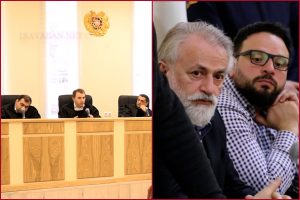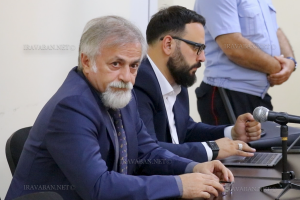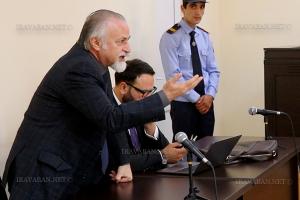Presiding judge Karen Amiryan asked Vahagn Vermishyan’s defender Alexander Kochubayev during his closing speech why he hadn’t mentioned about crime provocation in the court of first instance and in the appeal, and only mentions it in the closing speech: “4-5 years have passed, did you just now come up with the idea that you might be dealing with provocation?”
The judge also directed a second question to the defender: “You cite several European Court decisions mentioned and not mentioned by you that relate to provocation, are these decisions applicable here from the perspective of the fact pattern, is there a European Court decision that records: if law enforcement bodies have obtained data through legally obtained operational intelligence measures, but applied to court, received permission and continued, do we want that European Court decision that qualified such a situation as provocation?”
Regarding the first question, the advocate noted that they can only speak about this circumstance at this stage because in the court of first instance they did everything arising from the situation to receive all operational intelligence packages, which wasn’t provided, the same happened in the appellate court as well.
“That is, this is not brought as data refuting the accusation, this is a necessary assertion for the court’s inner conviction, because now, since we don’t have the substantive operational intelligence package, we cannot say whether it was before or after, because, for example, Mr. Vermishyan both in first instance and here said that there was an armrest of these video recordings, which he removed (Iravaban.net: from the office) 3 days after being appointed to the position. That is, a person saw a month’s video footage, while the operational intelligence permission was in November,” said Kochubayev.
In response to the question about crime provocation, the defender said there are key legal positions in the decisions stating that law enforcement bodies shouldn’t wait for the crime to be committed before intervening: “If the act could have been limited to 1 episode, today we have 7 episodes, which occurred precisely because of that inaction. In the episodes I mentioned, when the first one was recorded, in the remaining 6 episodes the law enforcement bodies allowed provocation, because according to them, the official was engaged in illegal activities, and after recording the first illegal action, this should have been followed by criminal procedural procedures.”
Vahagn Vermishyan does not plead guilty to all episodes of the charges and demands acquittal.
Details in the video.

















